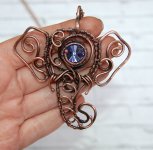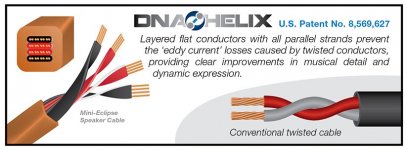If you first describe the advantages of splicing.I have no idea what is meant by "a proper speaker cable". Perhaps you can define exactly what that might be.
//
Can someone please explain how a splice in a speaker cable can possibly make any difference in the sound you hear from the speakers.
Can someone teach you how to listen? Perhaps someone can, but that's not me 🙂
IMLE (in my listening experience) termination of speaker cables is very audible, on par with the wire itself. Discontinuities and solder joints even more so. RCL parameters are a ludicrous simplification of what may be audible.
The elephant in the room everybody seems to ignore.
To what you have to say, I'm all ears! 😀
Attachments
One can still find work as an audiophile with golden ears even if the answer is no.If yes, get yourself certified and find work as an audiophile with golden ears.
What they will tell you is something they've perceived but they will call that as something they've heard.And then further explain how the exact type of splice can be heard.
As for physicality of splicing wires, https://en.wikipedia.org/wiki/Western_Union_splice
So, if RLC parameters are, as you say, "a ludicrous simplification of what may be audible", then please describe exactly what parameters do determine what you hear. Assurdedly there must be some parameters, or we would hear nothing. I just want to know what that those are.Can someone teach you how to listen? Perhaps someone can, but that's not me 🙂
IMLE (in my listening experience) termination of speaker cables is very audible, on par with the wire itself. Discontinuities and solder joints even more so. RCL parameters are a ludicrous simplification of what may be audible.
Last edited:
The advantages of splicing seem to be pretty obvious. With splicing you can get a current to flow from one wire into another.If you first describe the advantages of splicing.
//
Now back to my question, which you have avoided. What exactly is a "proper speaker cable" that you referred to.
I just want to know what that those are.
Me too. I would also want to know more about audio and the Universe in general. For some reason there are plenty of unanswered questions 🙂
And until that time when everything is revealed i intend to improve my system through listening, experiments and empirical knowledge.
There are no unanswered questions in electrical engineering regarding the basic flow of current through wires. Those principles have been understood and confirmed for almost two hundred years. People who won't acknowledge that are just kidding themselves. Which is fine. Just don't expect others to buy into something that has no scientific basis whatsoever.Me too. I would also want to know more about audio and the Universe in general. For some reason there are plenty of unanswered questions 🙂
And until that time when everything is revealed i intend to improve my system through listening, experiments and empirical knowledge.
We know Maxwell's equations, we just don't know why cables make us hear things differently. We don't even have a plausible theory why wire material makes such a big difference. Copper vs silver, ofc vs occ.
Should we choose not to hear the obvious until such times as theories and measurements are assigned to it? Dunno about you but my life expectancy is short for that.
Should we choose not to hear the obvious until such times as theories and measurements are assigned to it? Dunno about you but my life expectancy is short for that.
What do you mean "we"? Did you mean you just don't know why?we just don't know why cables make us hear things differently.
Wow - no sh*t! :-D.... With splicing you can get a current to flow from one wire into another. ...
//
I answered your question, but you still haven't answered mine. You just keep avoiding it with a bunch of nonsense. Let me know if you want to have a serious discussion.Wow - no sh*t! :-D
//
Last edited:
And that's because they don't. You can't explain human perception and bias in terms of actual and fully understood science. Any attempt to do so is just plain silly.We know Maxwell's equations, we just don't know why cables make us hear things differently. We don't even have a plausible theory why wire material makes such a big difference.
This idea that somehow along the way over the last two hundred years all of our actual scientists have missed some mysterious and illusive phenomena in how current moves through wires is absurd. It defies any reasonable thought on the matter.
I had to borrow some AC extention lines. They are flexible and sound pretty good in a pinch.
There should only be ONE speaker connection, all universal spades.
Other than that ^ its bare wires for me.
I bought this not knowing its inner construction. Its next to impossible to cut then re-crimp as it is factory done https://vinylsound.ca/products/wireworld-solstice-8-speaker-cable-sos
They sound quite good but that extra fancy stuff wasn't necessary. I can't see how it isnt similar to any other quality copper braid speaker wire, I have used it all. But it looks pretty and up to date 😉. That can give sales the edge.
Anything to sell more speaker wire I suppose.
There should only be ONE speaker connection, all universal spades.
Other than that ^ its bare wires for me.
I bought this not knowing its inner construction. Its next to impossible to cut then re-crimp as it is factory done https://vinylsound.ca/products/wireworld-solstice-8-speaker-cable-sos
They sound quite good but that extra fancy stuff wasn't necessary. I can't see how it isnt similar to any other quality copper braid speaker wire, I have used it all. But it looks pretty and up to date 😉. That can give sales the edge.
Anything to sell more speaker wire I suppose.
Attachments
Last edited:
I would but I think I'll stop here.I answered your question, but you still haven't answered mine. You just keep avoiding it with a bunch of nonsense. Let me know if you want to have a serious discussion.
//
They sound quite good but that extra fancy stuff wasn't necessary. I can't see how it isnt similar to any other quality copper braid speaker wire, I have used it all. Anything to sell more speaker wire I suppose.
I'm glad you think so.
However, according to the cable maker, "The most audible differences among interconnects and speaker cables are caused by electromagnetic (inductive) loss, which is the sum of proximity effect, skin effect and the especially problematic eddy current resistance."
Eddy currents? Now that's a drag! 😀
What is a "proper" speaker cable? Perhaps one that reaches from amplifier to speaker, rather than one patched together from shorter scraps of wire.
Just an opinion...
Just an opinion...
There's a powerful point of view from WuBai over on this current thread: https://www.diyaudio.com/community/threads/cap-choice.382803/
See post #5, and for "capacitors" substitute "cables".
See post #5, and for "capacitors" substitute "cables".
- Home
- General Interest
- Everything Else
- Splicing speaker cable


